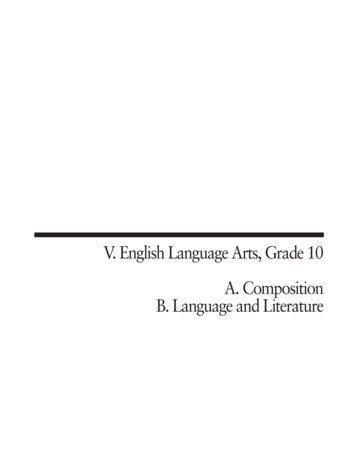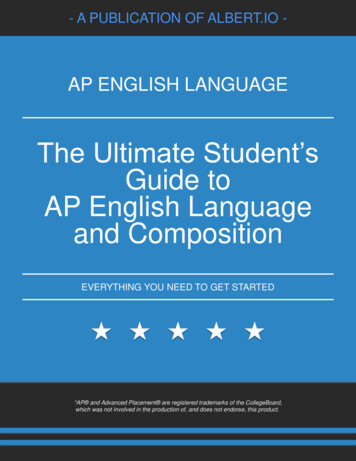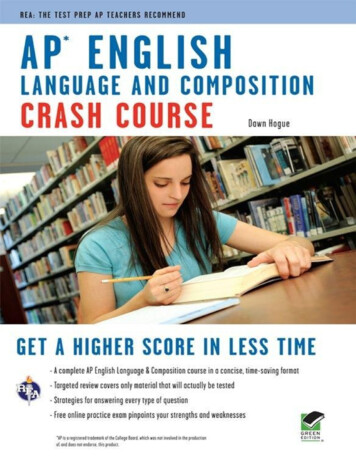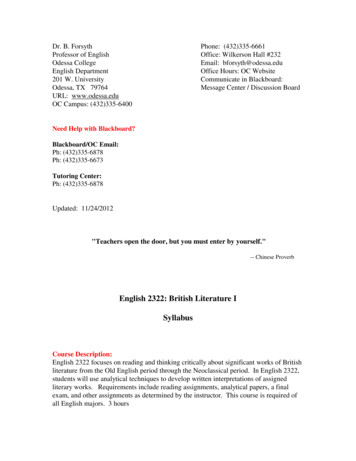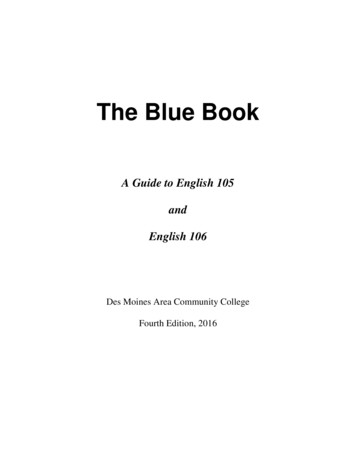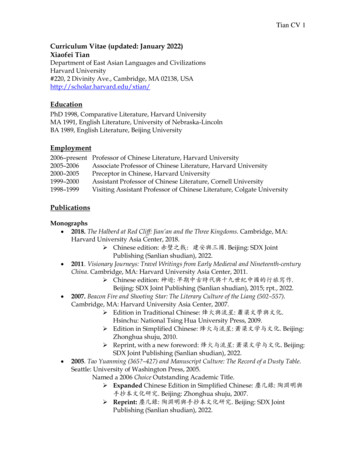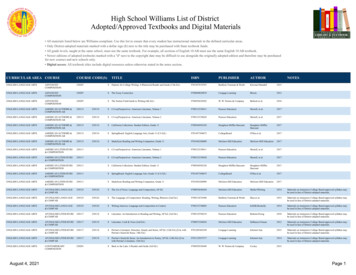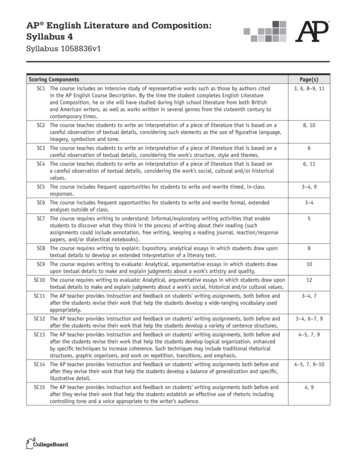
Transcription
AP English Literature and Composition:Syllabus 4Syllabus 1058836v1Scoring ComponentsSC1 The course includes an intensive study of representative works such as those by authors citedin the AP English Course Description. By the time the student completes English Literatureand Composition, he or she will have studied during high school literature from both Britishand American writers, as well as works written in several genres from the sixteenth century tocontemporary times.SC2 The course teaches students to write an interpretation of a piece of literature that is based on acareful observation of textual details, considering such elements as the use of figurative language,imagery, symbolism and tone.3, 6, 8–9, 118, 10SC3 The course teaches students to write an interpretation of a piece of literature that is based on acareful observation of textual details, considering the work’s structure, style and themes.6SC4 The course teaches students to write an interpretation of a piece of literature that is based ona careful observation of textual details, considering the work’s social, cultural and/or historicalvalues.6, 11SC5 The course includes frequent opportunities for students to write and rewrite timed, in-classresponses.3–4, 9SC6 The course includes frequent opportunities for students to write and rewrite formal, extendedanalyses outside of class.3–4SC7 The course requires writing to understand: Informal/exploratory writing activities that enablestudents to discover what they think in the process of writing about their reading (suchassignments could include annotation, free writing, keeping a reading journal, reaction/responsepapers, and/or dialectical notebooks).5SC8 The course requires writing to explain: Expository, analytical essays in which students draw upontextual details to develop an extended interpretation of a literary text.8SC9 The course requires writing to evaluate: Analytical, argumentative essays in which students drawupon textual details to make and explain judgments about a work’s artistry and quality.10SC10 The course requires writing to evaluate: Analytical, argumentative essays in which students draw upontextual details to make and explain judgments about a work’s social, historical and/or cultural values.1Page(s)12SC11 The AP teacher provides instruction and feedback on students’ writing assignments, both before andafter the students revise their work that help the students develop a wide-ranging vocabulary usedappropriately.3–4, 7SC12 The AP teacher provides instruction and feedback on students’ writing assignments, both before andafter the students revise their work that help the students develop a variety of sentence structures.3–4, 6–7, 9SC13 The AP teacher provides instruction and feedback on students’ writing assignments, both before andafter the students revise their work that help the students develop logical organization, enhancedby specific techniques to increase coherence. Such techniques may include traditional rhetoricalstructures, graphic organizers, and work on repetition, transitions, and emphasis.4–5, 7, 9SC14 The AP teacher provides instruction and feedback on students’ writing assignments both before andafter they revise their work that help the students develop a balance of generalization and specific,illustrative detail.4–5, 7, 9–10SC15 The AP teacher provides instruction and feedback on students’ writing assignments both before andafter they revise their work that help the students establish an effective use of rhetoric includingcontrolling tone and a voice appropriate to the writer’s audience.4, 9
AP English Literature and Composition Syllabus 4Understandings:Essential Questions:What will students understand (about whatbig ideas) as a result of the unit? Studentswill understand that:What arguable, recurring, and thoughtprovoking questions will guide inquiry andpoint toward the big ideas of the unit? Literature provides a mirror to help usunderstand ourselves and others. Writing is a form of communicationacross the ages. Literature reflects the human condition. Literature deals with universal themes,i.e., man vs. man, man vs. nature, manvs. self, man vs. God. Literature reflects its time’s social,cultural, and historical values.Syllabus 1058836v1 How does literature help us understandourselves and others? How has writing become acommunication tool across the ages? How does literature reflect the humancondition? How does literature express universalthemes?Major Concepts/ContentAP English Literature and Composition is designed to be a college/university levelcourse, thus the “AP” designation on a transcript rather than “H” (Honors) or “CP”(College Prep). This course will provide you with the intellectual challenges andworkload consistent with a typical undergraduate university English literature/Humanities course. As a culmination of the course, you will take the AP EnglishLiterature and Composition Exam given in May (required). A grade of 4 or 5 on thisexam is considered equivalent to a 3.3–4.0 for comparable courses at the collegeor university level. A student who earns a grade of 3 or above on the exam will begranted college credit at most colleges and universities throughout the United States.Course Goals1. To carefully read and critically analyze imaginative literature.2. To understand the way writers use language to provide meaning and pleasure.3. To consider a work’s structure, style, and themes as well as such smaller scaleelements as the use of figurative language, imagery, symbolism, and tone.4. To study representative works from various genres and periods (from thesixteenth to the twentieth century) and to know a few works extremely well.5. To understand a work’s complexity, to absorb richness of meaning, and toanalyze how meaning is embodied in literary form.6. To consider the social and historical values a work reflects and embodies.7. To write, focusing on critical analysis of literature including expository, analytical,and argumentative essays as well as creative writing to sharpen understanding ofwriters’ accomplishments and deepen appreciation of literary artistry.8. To become aware of, through speaking, listening, reading, and, chiefly, writing, theresources of language: connotation, metaphor, irony, syntax, and tone.2
AP English Literature and Composition Syllabus 4Required Texts and MaterialsIn the AP English Literature course, the student should consider obtaining a personalcopy of the various novels, plays, epics, poems, and short fiction used in the course.You may purchase copies from a local new or used bookstore, or from an online booksource.If available, you may check out books from your school’s English department. All titlesmay also be found in the local library branches. Some of the works used can also beaccessed online.Preliminary list of novels, dramas, and anthologized material: [SC1] Frankenstein, ShelleyThe Tragedy of Hamlet, Prince of Denmark, ShakespeareHeart of Darkness, ConradDeath of a Salesman, MillerOedipus Tyrannos, Sophocles [please use selected translation]Short fiction and essays — as selectedPoetry — as selectedModern novels — as selectedWriting About Literature, E. V. RobertsPerformance Tasks: Timed essays based on past AP prompts [SC5]Essay questions as required of college-level writersReading/responding to/analyzing novels, drama, fiction, nonfiction, and poetryImaginative writing including but not limited to: poetry and imitativestructuresLiterary analysis papers — expository and persuasivePersonal essayGraphic organizers, double-entry journals, paragraph responses, and questionsCourse SyllabusWriting ExpectationsAs this is a literature and composition course, you will be expected to use everyassignment that involves writing and rewriting to practice your best composition skills.Composition assignments will include: statements, paragraphs, timed writes (essaytests), and formal essays (personal, expository, and argumentative). [SC5 & SC6] Nomatter the kind of writing assigned, your best composition skills should be practiced.We will work with various composition constructions, Standard Written English,sentence variety, and word choice. [SC11 & SC12]When an assignment calls for a “paragraph,” please check your work against theparagraph criteria below:Syllabus 1058836v1SC1—The course includesan intensive study ofrepresentative works suchas those by authors citedin the AP English CourseDescription. By the timethe student completesEnglish Literature andComposition, he or shewill have studied duringhigh school literature fromboth British and Americanwriters, as well as workswritten in several genresfrom the sixteenth centuryto contemporary times.SC5—The course includesfrequent opportunities forstudents to write and rewritetimed, in-class responses.SC6—The course includesfrequent opportunitiesfor students to write andrewrite formal, extendedanalyses outside of class.SC11—The AP teacherprovides instruction andfeedback on students’writing assignments, bothbefore and after the studentsrevise their work that helpthe students develop a wideranging vocabulary usedappropriately.SC12—The AP teacherprovides instruction andfeedback on students’writing assignments,both before and after thestudents revise their workthat help the studentsdevelop a variety ofsentence structures.3
AP English Literature and Composition Syllabus 41. Many times you will be asked for your opinion or idea about an aspect ofa work of literature. You will post these to a discussion board. Please usecomplete sentences with clear support for your ideas.2. All assignments for formal papers will include a specific grading rubric. Wewill go over the rubrics prior to submitting papers and review expectationsfor the particular composition or paper. Please consult each rubric carefullybefore submitting your work. Chapters from Roberts, Edgar V. Writing AboutLiterature (9th ed. Upper Saddle River, NJ: Prentice Hall, 1999) will supplementcomposition instruction. You will be expected to rewrite larger papers andliterary analyses after you receive feedback.3. Timed writes (essay tests) and feedback. [SC5 & SC6] These will be scoringguides as used by the AP English Literature and Composition Exam for thatspecific question. Essay tests will need to be typed directly into the blank testonline. Do not type an essay onto a word document and then cut and paste itinto the answer space. You will be expected to rewrite larger papers and literaryanalyses after you receive feedback. [SC11, SC12, SC13, SC14 & SC15]4. Grammar and usage: As a senior in an AP English Literature and Compositioncourse, you should have a good command of Standard Written English. Therewill be mini-lessons throughout the course dealing with complex grammar andusage issues, sentence constructions, and diction. Occasionally you may needsome additional help with this. [SC11 & SC12]There are many good online guides to grammar. The link below is one such .htmSyllabus 1058836v1SC5—The course includesfrequent opportunities forstudents to write and rewritetimed, in-class responses.SC6—The course includesfrequent opportunitiesfor students to write andrewrite formal, extendedanalyses outside of class.SC13—The AP teacherprovides instruction andfeedback on students’writing assignments, bothbefore and after the studentsrevise their work that helpthe students develop logicalorganization, enhancedby specific techniques toincrease coherence. Suchtechniques may include traditional rhetorical structures,graphic organizers, and workon repetition, transitions,and emphasis.Please consult this guide or a writing handbook for grammar problems.Pre-Course Assignment Actively read Frankenstein. Complete a literary analysis outline based on E. V. Roberts’s techniquequestions from Writing About Literature. Consider the title of the novel Myth of Prometheus. Actively read The Rime of the Ancient Mariner. Think about the connectionbetween Coleridge’s poem and Shelley’s novel. Write speculatively about the connection between Frankenstein and The Rimeof the Ancient Mariner.SC14—The AP teacherprovides instruction andfeedback on students’writing assignments bothbefore and after theyrevise their work that helpthe students develop a balance of generalization andspecific, illustrative detail.SC15—The AP teacherprovides instruction andfeedback on students’writing assignments bothbefore and after theyrevise their work that helpthe students establish aneffective use of rhetoricincluding controlling toneand a voice appropriate tothe writer’s audience.4
AP English Literature and Composition Syllabus 4 Focus composition — construct clear, competent paragraphs that usetransitions, topic sentences, support sentences, and lines/quotes from works.[SC13 & SC14 ]Unit 1: Genre Study3 WeeksWhat does the term genre mean?Genre: A category of literary work. In critical theory, genre may refer to both thecontent of a given work — tragedy, comedy, or pastoral — and to its form, such aspoem, novel, or drama.This term also refers to types of popular literature, as in the genres of science fictionor mystery.What are the different genres of literature?There are many ways we might answer this question. The basic types or largercomponents of literature, however, can be grouped into categories, including novel,short fiction, poetry, drama, and epic.How does a writer of poetry and prose craft a work of literary merit?Contrary to the opinion of many of my former students, works of fabulous imaginationseldom fall from the sky. Writers of great literature are “technicians of their form,” thatis, they use all the tools of literary technique, language, and style to enhance theirworks.What sort of writing skill will an AP student need to acquire in order to be successfulin this class and in college?Your goal will be to emulate the masters of the English language and to become a“technician,” employing all the tools of literary technique, language, and style.Unit ExpectationsStudents will gain experience with: Close reading of fiction, drama, and poetry Composition instruction (see writing expectations): Students will take material from their double-entry journals dealing withcentral themes in Frankenstein [SC7] and use the material to develop aninterpretive essay based on a central theme in the novel.Syllabus 1058836v1SC13—The AP teacherprovides instruction andfeedback on students’writing assignments,both before and after thestudents revise their workthat help the studentsdevelop logical organization,enhanced by specifictechniques to increasecoherence. Such techniquesmay include traditionalrhetorical structures, graphicorganizers, and work onrepetition, transitions, andemphasis.SC14—The AP teacherprovides instruction andfeedback on students’writing assignments bothbefore and after theyrevise their work that helpthe students develop abalance of generalizationand specific, illustrativedetail.SC7— The course requireswriting to understand:Informal/exploratorywriting activities thatenable students todiscover what they thinkin the process of writingabout their reading(such assignments couldinclude annotation, freewriting, keeping a readingjournal, reaction/responsepapers, and/or dialecticalnotebooks).5
AP English Literature and Composition Syllabus 4 Students may select a theme of their own, granted that it is approved bythe instructor, or they may select one of these two themes: the tensionbetween individualism and social acceptance; or the tension betweentechnology and human aspiration. [SC3 & SC4] On-demand writing — experience with timed writing about prose —complex characterization, figurative language, and resources of language Evaluation of on-demand writing — working with a scoring guide Paragraph writing, short answers, and graphic organizersLiterary terms and techniques Elements of literature including novel, short story, and dramaNovel: FrankensteinNonfiction: Introduction to FrankensteinShort Story: “A Jury of Her Peers”Drama: TriflesPoetry: The Rime of the Ancient Mariner, “Ode on a Grecian Urn” [SC1]Unit 2: Personal Essay for College Admission/Scholarship Application2 Weeks Writers often use the personal reminiscence/personal essay/essay ofexperience to state an opinion, explain a viewpoint, or clarify the significanceof a person or event. The personal essay may take one of three forms: personal essay, personalreminiscence, or essay of experience.Unit Objectives Students will explore ideas about themselves to determine their topics for writing. Students will understand and work with personal writing — including, but notlimited to, anecdote, dialogue, details, language, syntax, and varied sentencestructures. [SC12] Students will receive direct composition instruction on introduction/opening,voice, use of first-person pronouns, apostrophes, and conventions. Students will work with conventions of Standard Written English.Syllabus 1058836v1SC3—The course teachesstudents to write aninterpretation of a pieceof literature that is basedon a careful observation oftextual details, consideringthe work’s structure, styleand themes.SC4—The course teachesstudents to write aninterpretation of a pieceof literature that is basedon a careful observation oftextual details, consideringthe work’s social, culturaland/or historical values.SC1—The course includesan intensive study ofrepresentative works suchas those by authors citedin the AP English CourseDescription. By the timethe student completesEnglish Literature andComposition, he or shewill have studied duringhigh school literature fromboth British and Americanwriters, as well as workswritten in several genresfrom the sixteenth centuryto contemporary times.SC12—The AP teacherprovides instruction andfeedback on students’writing assignments,both before and after thestudents revise their workthat help the studentsdevelop a variety ofsentence structures.6
AP English Literature and Composition Syllabus 4 Students will participate in peer editing and rewriting/revising. [SC11, SC12,SC13, SC14 & SC15] Students will complete at least one personal essay for college admission.Unit 3: Classical and Modern Tragedy4 WeeksWorld Literature in Translation: National Standards Students read a wide range of print and nonprint texts to build anunderstanding of texts, of themselves, and of the cultures of the United Statesand the world; to acquire new information; to respond to the needs anddemands of society and the workplace; and to gain personal fulfillment. Amongthese texts are fiction, nonfiction classic, and contemporary works. Students read a wide range of literature from many periods in many genres tobuild an understanding of the many dimensions (e.g., philosophical, ethical,aesthetic) of human experience.Aristotle: TragedySophocles: Oedipus Tyrannus Oedipus Tyrannus is a discussion of the conflict between faith and doubt.Oedipus represents any of us who wrestle with our own problems of faith anddoubt; he represents all of our hopes and fears. Sophocles wanted Oedipus to teach that man’s confidence in his own ability isan illusion if he abandons the idea of a higher power. This play seeks truth about the cosmos. Every detail of Oedipus Tyrannus iscontrived so as to reinforce the conception of order disturbed and order restored. Knowledge comes through suffering. It was not going to happen because it was foretold. It was foretold because itwas going to happen. Character is Fate.Syllabus 1058836v1SC11—The AP teacherprovides instruction andfeedback on students’writing assignments,both before and afterthe students revisetheir work that help thestudents develop a wideranging vocabulary usedappropriately.SC12—The AP teacherprovides instruction andfeedback on students’ writing assignments, both before and after the studentsrevise their work that helpthe students develop a variety of sentence structures.SC13—The AP teacherprovides instruction andfeedback on students’writing assignments,both before and after thestudents revise their workthat help the studentsdevelop logical organization,enhanced by specifictechniques to increasecoherence. Such techniquesmay include traditionalrhetorical structures, graphicorganizers, and work onrepetition, transitions, andemphasis.SC15—The AP teacherprovides instruction andfeedback on students’writing assignments bothbefore and after theyrevise their work that helpthe students establish aneffective use of rhetoricincluding controlling toneand a voice appropriate tothe writer’s audience.7
AP English Literature and Composition Syllabus 4Arthur Miller: Death of a Salesman [SC1]Modern playwrights have interpreted Aristotle’s definition of tragedy to include humankind’sperception of the universal human lot. The primary amendments made by modernplaywrights are that the tragic hero need not be high born and the language of theplay need not be verse. In his essay entitled “Tragedy and the Common Man,” ArthurMiller asserts “that the common man is an apt subject for tragedy in its highest senseas kings were.”Unit Expectationsa) Active reading/Cornell Notes incorporated into understanding drama, includingdramatic irony, theater beginnings, the origin and function of the chorus,imagery of sight and blindness, myth.b) Formal analysis/literary paper comparing and contrasting the tragic fate ofboth protagonists. Essay will be expository and analytical in nature. Studentswill write, edit, and rewrite. Paper will emphasize imagery and dramaticirony and will work with incorporating quotes, word choice, syntax, andunderstanding of the dialogue and details presented as support to writing. [SC8]Direct composition instruction: active verbs; clear, viable thesis statement;incorporation of lines and dialogue; and use of conventions as necessary.c) Timed write on tragedy, including scoring guide.d) Discussion: Character is fate; free will.Syllabus 1058836v1SC1—The course includesan intensive study ofrepresentative works suchas those by authors citedin the AP English CourseDescription. By the timethe student completesEnglish Literature andComposition, he or shewill have studied duringhigh school literature fromboth British and Americanwriters, as well as workswritten in several genresfrom the sixteenth centuryto contemporary times.SC8—The course requireswriting to explain:Expository, analytical essaysin which students draw upontextual details to develop anextended interpretation of aliterary text.Unit 4: Introduction to Poetry4 WeeksStudents will learn that: Reading poetry well means responding to it; if one responds on a feeling level,he or she is likely to read more accurately, with deeper understanding, andwith greater pleasure. Reading poetry accurately, and with attention to detail, will enable one torespond to it on an emotional level. Reading poetry involves conscious articulation through language, and readingand responding come to be, for experienced readers of poetry, very nearly one. Paying close attention to the text in poetry makes one appreciate andunderstand textuality and its possibilities.Unit ExpectationsStudy and analyze poems from the Renaissance.a) Introduction: Essay of analysis. This essay is a literary analysis (expository) —Shakespeare’s “Winter” including teacher model and rubric. Essay will be sharedin class and emphasis includes sonnet form, paraphrase, imagery, syntax, andpoetic language. [SC2]SC2—The course teachesstudents to write aninterpretation of a pieceof literature that is basedon a careful observation oftextual details, consideringsuch elements as the use offigurative language, imagery,symbolism and tone.8
AP English Literature and Composition Syllabus 4Direct composition instruction: summary/paraphrase, thesisstatement, syntax/sentence structures, audience. [SC12, SC14& SC15]b) Ballad — analyze using calloutsc) Sonnet — study and analyze multiple sonnets, write anoriginal sonnetd) Metrical Romancee) Timed write — literary analysis comparing and contrastingtwo Renaissance sonnets including samples and scoring guide.[SC8] Direct Composition Instruction: compare and contrast,thesis statementf) Multiple-choice practiceUnit 5: The Tragedy of Hamlet, Prince of Denmark [SC1]5 Weeks“For anything so overdone is from the purpose of playing, whose end,both at the first and now was and is, to hold, as ’twere, the mirror upto nature, to show virtue her own feature, scorn her own image, andthe very age and body of the time his form and pressure.” — Hamlet,Prince of Denmark, act 3, scene 2 Why is Hamlet considered by many to be Shakespeare’sgreatest achievement?How and why is the character of Hamlet depicted as the mostcomplex in English literature?Unit Expectationsa) Study includes the great chain of being; Shakespeare’slanguage, form, and function of tragedy; and religious,scientific, and cultural beliefs of the Elizabethan age.b) Essay test/timed write using question #3 from 1993 and 1994AP English Literature and Composition Exams. [SC5]Syllabus 1058836v1SC12—The AP teacherprovides instruction andfeedback on students’ writing assignments, both before and after the studentsrevise their work that helpthe students develop a variety of sentence structures.SC13—The AP teacherprovides instruction andfeedback on students’ writing assignments, both before and after the studentsrevise their work that helpthe students develop logical organization, enhancedby specific techniques toincrease coherence. Suchtechniques may includetraditional rhetoricalstructures, graphic organizers, and work on repetition,transitions, and emphasis.SC1—The course includesan intensive study ofrepresentative works suchas those by authors citedin the AP English CourseDescription. By the timethe student completesEnglish Literature andComposition, he or shewill have studied duringhigh school literature fromboth British and Americanwriters, as well as workswritten in several genresfrom the sixteenth centuryto contemporary times.SC5—The course includesfrequent opportunitiesfor students to write andrewrite timed, in-classresponses.9
AP English Literature and Composition Syllabus 4c) Literary analysis paper — formal, persuasive essay evaluating Hamlet based onone of the two questions above. [SC9] Direct composition instruction: format— clear thesis, incorporation of lines and quotes, pronoun usage, supportparagraphs, introduction necessary for audience, thesis followed throughout,strong concluding paragraph. [SC14]Unit 6: Short Fiction and Satire4 Weeks“Satire is a sort of glass, wherein beholders do generally discover everybody’s face buttheir own; which is the chief reason for that kind of reception it meets in the world,and that so very few are offended with it.” — Jonathan SwiftUnit Expectationsa) Study of short fiction and literary terms and techniques, emphasizing point ofview and tone.b) Analysis of multiple short stories using graphic organizers. Two short interpretation papers based on point of view and tone, using twoshort story structures [SC2] Timed write on short fiction including samples and scoring guidec) The Sting of Satire: “A Modest Proposal,” selections from Gulliver’s Travels andCandide. [SC1] Guest speaker — satirist Jim Kershnerd) Timed write on irony and satire.Unit 7: The Novel — Heart of Darkness, Conrad [SC1]3 Weeks“‘The sea molds character,’ he said, ‘yet, in setting the conditions for shipboarddrama — as to some extent it inevitably must — it reveals, like a mirror, the face ofcharacter itself.’”Joseph Conrad’s Heart of Darkness “is the most vividly realized account in literatureof the experiences of a European in colonial Africa, and as such is a document ofhistorical importance as well as a literary classic.”Students will explore the literary techniques of impressionistic writing, frame narrative,inference, and symbolism.Unit 8: Metaphysical to Modern Poetry3 Weeks“Poetry is a mirror which makes beautiful that which is distorted.” — Percy Shelley Responding to poetry involves remembering and reflecting. Your knowledge and life experience informs your reading of what is before you,and allows you to connect things within the text — events, images, words,sounds — so that meanings and feelings develop and accumulate.Syllabus 1058836v1SC9—The course requireswriting to evaluate:Analytical, argumentativeessays in which studentsdraw upon textual detailsto make and explainjudgments about a work’sartistry and quality.SC14—The AP teacherprovides instruction andfeedback on students’writing assignments bothbefore and after theyrevise their work that helpthe students develop abalance of generalizationand specific, illustrativedetail.SC2—The course teachesstudents to write aninterpretation of a pieceof literature that is basedon a careful observation oftextual details, consideringsuch elements as the use offigurative language, imagery,symbolism and tone.SC1—The course includesan intensive study ofrepresentative works suchas those by authors citedin the AP English CourseDescription. By the timethe student completesEnglish Literature andComposition, he or shewill have studied duringhigh school literature fromboth British and Americanwriters, as well as workswritten in several genresfrom the sixteenth centuryto contemporary times.10
AP English Literature and Composition Syllabus 4 Poems, even when they are about things of which we have no experience,connect to things we do know and order our memories, thoughts, and feelingsin new and newly challenging ways. Reading poetry can ultimately enrich your life by helping you become morearticulate and more sensitive both to ideas and feelings: that’s the larger goal.But the more immediate goal — and the route to the larger one — is to makeyou a better reader of texts and a more precise and careful writer yourself. Poems, perhaps even more than other texts, can sharpen your reading skillsbecause they tend to be so compact, so fully dependent on concise expressionsof feeling. In poems
English Literature and Composition, he or she will have studied during high school literature from both British and American writers, as well as works written in several genres from the sixteenth century to contemporary times. SC5—The course includes frequent opportunities for

